ENTREPRENEURSHIP AND SMALL BUSINESS MANAGEMENT REPORT (University)
VerifiedAdded on 2023/01/19
|15
|4621
|44
Report
AI Summary
This report provides a comprehensive overview of entrepreneurship and small business management. It begins by defining entrepreneurship and small businesses, then explores different types of entrepreneurial ventures, including aggressive growth, survival, managed growth, public, and private ventures, alongside their relationship to entrepreneurship typology. The report then analyzes the impact of micro and small businesses on the economy, highlighting their role in employment, innovation, and economic growth. Furthermore, it examines the characteristics, traits, and skills of successful entrepreneurs, differentiating them from other business managers, and delves into measuring aspects of entrepreneurial personality, motivation, and mindset. Finally, the report investigates the background and experience of entrepreneurs and their influence on their entrepreneurial endeavors. The report also includes the impact of small businesses in the country's economy as well as international context and characteristic, skills of successful entrepreneurs along with their experience and background. This report is a valuable resource for students seeking to understand the complexities of entrepreneurship and small business management.

ENTREPRENEURSHIP AND
SMALL BUSINESS MANAGEMENT
SMALL BUSINESS MANAGEMENT
Paraphrase This Document
Need a fresh take? Get an instant paraphrase of this document with our AI Paraphraser
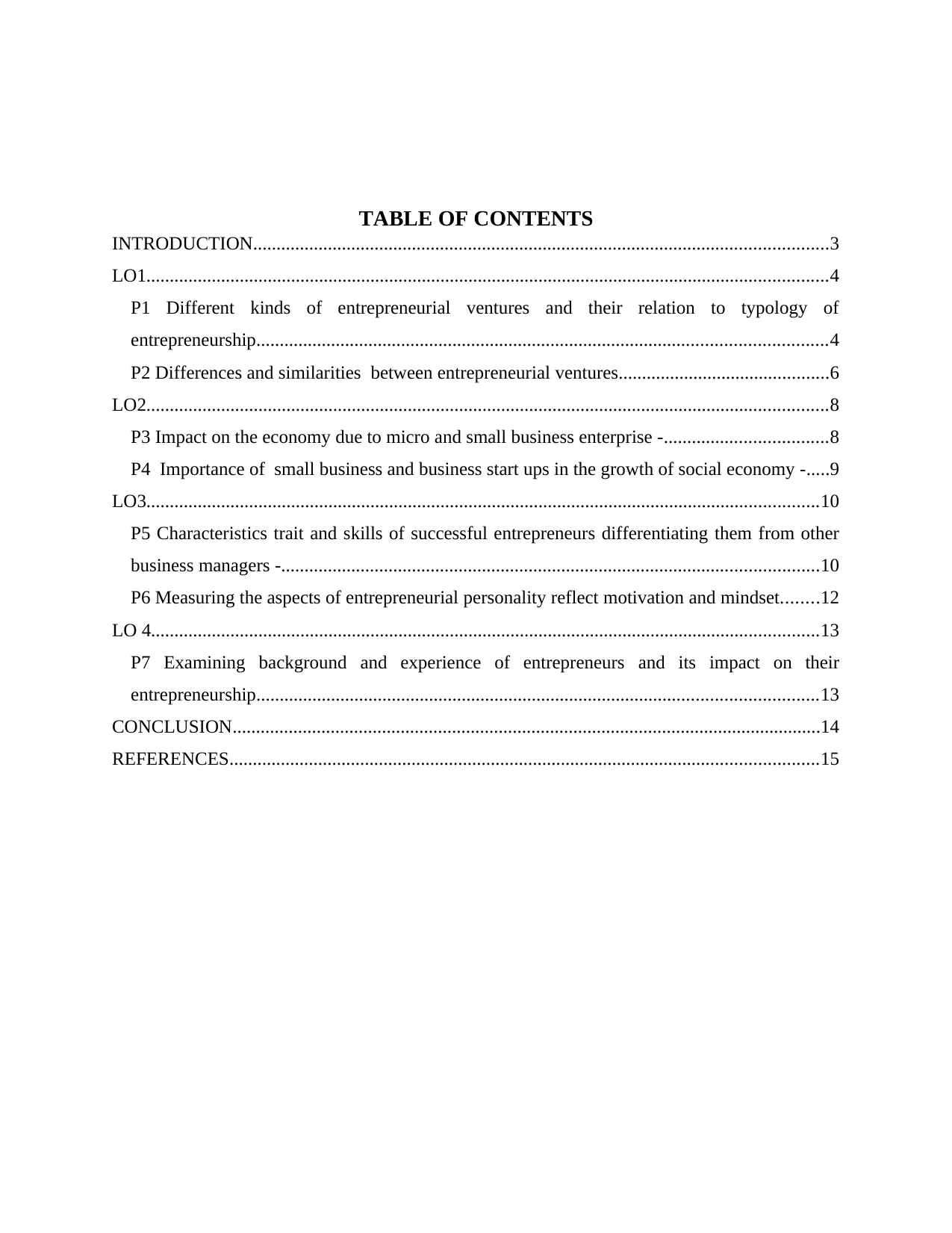
TABLE OF CONTENTS
INTRODUCTION...........................................................................................................................3
LO1..................................................................................................................................................4
P1 Different kinds of entrepreneurial ventures and their relation to typology of
entrepreneurship..........................................................................................................................4
P2 Differences and similarities between entrepreneurial ventures.............................................6
LO2..................................................................................................................................................8
P3 Impact on the economy due to micro and small business enterprise -...................................8
P4 Importance of small business and business start ups in the growth of social economy -.....9
LO3................................................................................................................................................10
P5 Characteristics trait and skills of successful entrepreneurs differentiating them from other
business managers -...................................................................................................................10
P6 Measuring the aspects of entrepreneurial personality reflect motivation and mindset........12
LO 4...............................................................................................................................................13
P7 Examining background and experience of entrepreneurs and its impact on their
entrepreneurship........................................................................................................................13
CONCLUSION..............................................................................................................................14
REFERENCES..............................................................................................................................15
INTRODUCTION...........................................................................................................................3
LO1..................................................................................................................................................4
P1 Different kinds of entrepreneurial ventures and their relation to typology of
entrepreneurship..........................................................................................................................4
P2 Differences and similarities between entrepreneurial ventures.............................................6
LO2..................................................................................................................................................8
P3 Impact on the economy due to micro and small business enterprise -...................................8
P4 Importance of small business and business start ups in the growth of social economy -.....9
LO3................................................................................................................................................10
P5 Characteristics trait and skills of successful entrepreneurs differentiating them from other
business managers -...................................................................................................................10
P6 Measuring the aspects of entrepreneurial personality reflect motivation and mindset........12
LO 4...............................................................................................................................................13
P7 Examining background and experience of entrepreneurs and its impact on their
entrepreneurship........................................................................................................................13
CONCLUSION..............................................................................................................................14
REFERENCES..............................................................................................................................15
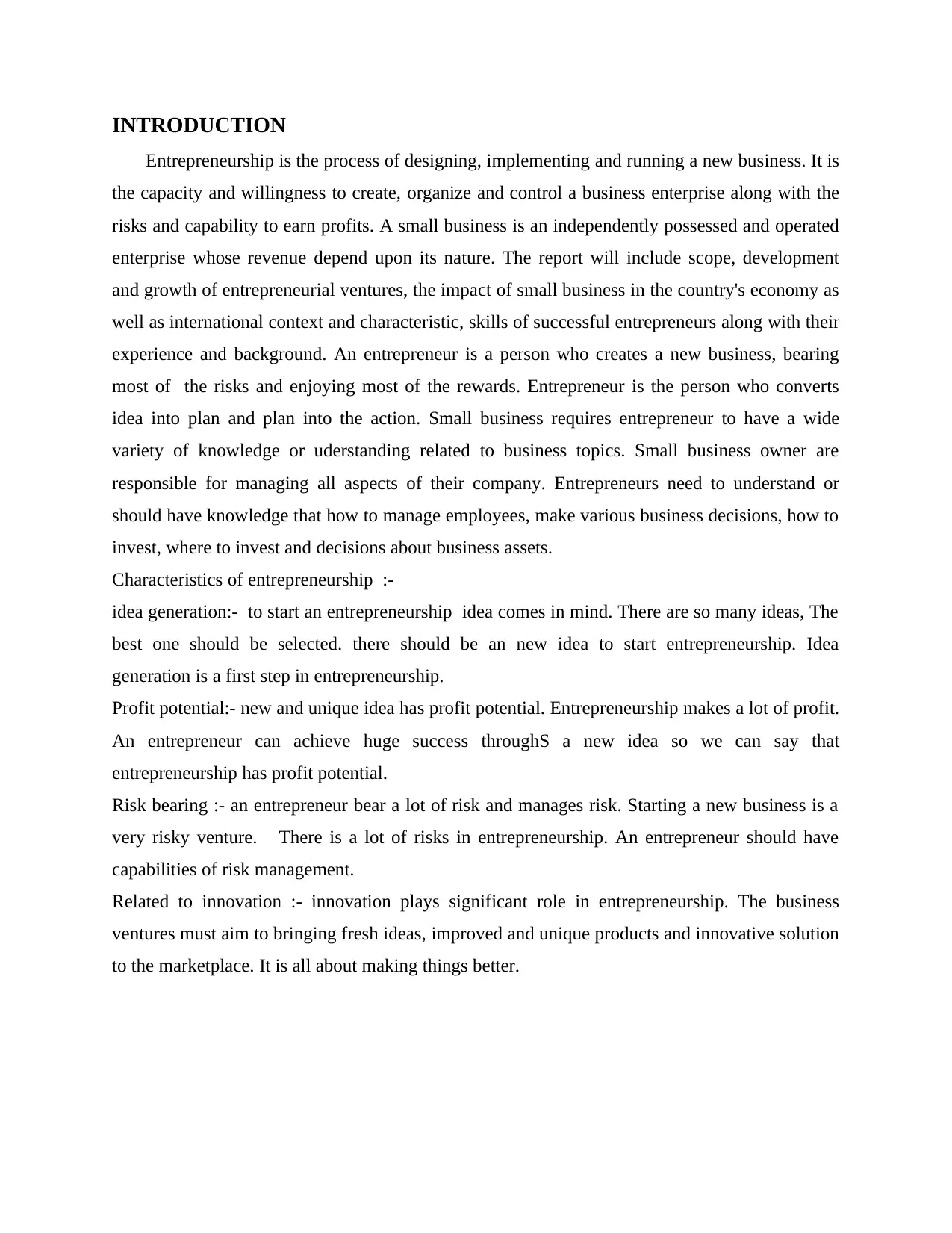
INTRODUCTION
Entrepreneurship is the process of designing, implementing and running a new business. It is
the capacity and willingness to create, organize and control a business enterprise along with the
risks and capability to earn profits. A small business is an independently possessed and operated
enterprise whose revenue depend upon its nature. The report will include scope, development
and growth of entrepreneurial ventures, the impact of small business in the country's economy as
well as international context and characteristic, skills of successful entrepreneurs along with their
experience and background. An entrepreneur is a person who creates a new business, bearing
most of the risks and enjoying most of the rewards. Entrepreneur is the person who converts
idea into plan and plan into the action. Small business requires entrepreneur to have a wide
variety of knowledge or uderstanding related to business topics. Small business owner are
responsible for managing all aspects of their company. Entrepreneurs need to understand or
should have knowledge that how to manage employees, make various business decisions, how to
invest, where to invest and decisions about business assets.
Characteristics of entrepreneurship :-
idea generation:- to start an entrepreneurship idea comes in mind. There are so many ideas, The
best one should be selected. there should be an new idea to start entrepreneurship. Idea
generation is a first step in entrepreneurship.
Profit potential:- new and unique idea has profit potential. Entrepreneurship makes a lot of profit.
An entrepreneur can achieve huge success throughS a new idea so we can say that
entrepreneurship has profit potential.
Risk bearing :- an entrepreneur bear a lot of risk and manages risk. Starting a new business is a
very risky venture. There is a lot of risks in entrepreneurship. An entrepreneur should have
capabilities of risk management.
Related to innovation :- innovation plays significant role in entrepreneurship. The business
ventures must aim to bringing fresh ideas, improved and unique products and innovative solution
to the marketplace. It is all about making things better.
Entrepreneurship is the process of designing, implementing and running a new business. It is
the capacity and willingness to create, organize and control a business enterprise along with the
risks and capability to earn profits. A small business is an independently possessed and operated
enterprise whose revenue depend upon its nature. The report will include scope, development
and growth of entrepreneurial ventures, the impact of small business in the country's economy as
well as international context and characteristic, skills of successful entrepreneurs along with their
experience and background. An entrepreneur is a person who creates a new business, bearing
most of the risks and enjoying most of the rewards. Entrepreneur is the person who converts
idea into plan and plan into the action. Small business requires entrepreneur to have a wide
variety of knowledge or uderstanding related to business topics. Small business owner are
responsible for managing all aspects of their company. Entrepreneurs need to understand or
should have knowledge that how to manage employees, make various business decisions, how to
invest, where to invest and decisions about business assets.
Characteristics of entrepreneurship :-
idea generation:- to start an entrepreneurship idea comes in mind. There are so many ideas, The
best one should be selected. there should be an new idea to start entrepreneurship. Idea
generation is a first step in entrepreneurship.
Profit potential:- new and unique idea has profit potential. Entrepreneurship makes a lot of profit.
An entrepreneur can achieve huge success throughS a new idea so we can say that
entrepreneurship has profit potential.
Risk bearing :- an entrepreneur bear a lot of risk and manages risk. Starting a new business is a
very risky venture. There is a lot of risks in entrepreneurship. An entrepreneur should have
capabilities of risk management.
Related to innovation :- innovation plays significant role in entrepreneurship. The business
ventures must aim to bringing fresh ideas, improved and unique products and innovative solution
to the marketplace. It is all about making things better.
⊘ This is a preview!⊘
Do you want full access?
Subscribe today to unlock all pages.

Trusted by 1+ million students worldwide
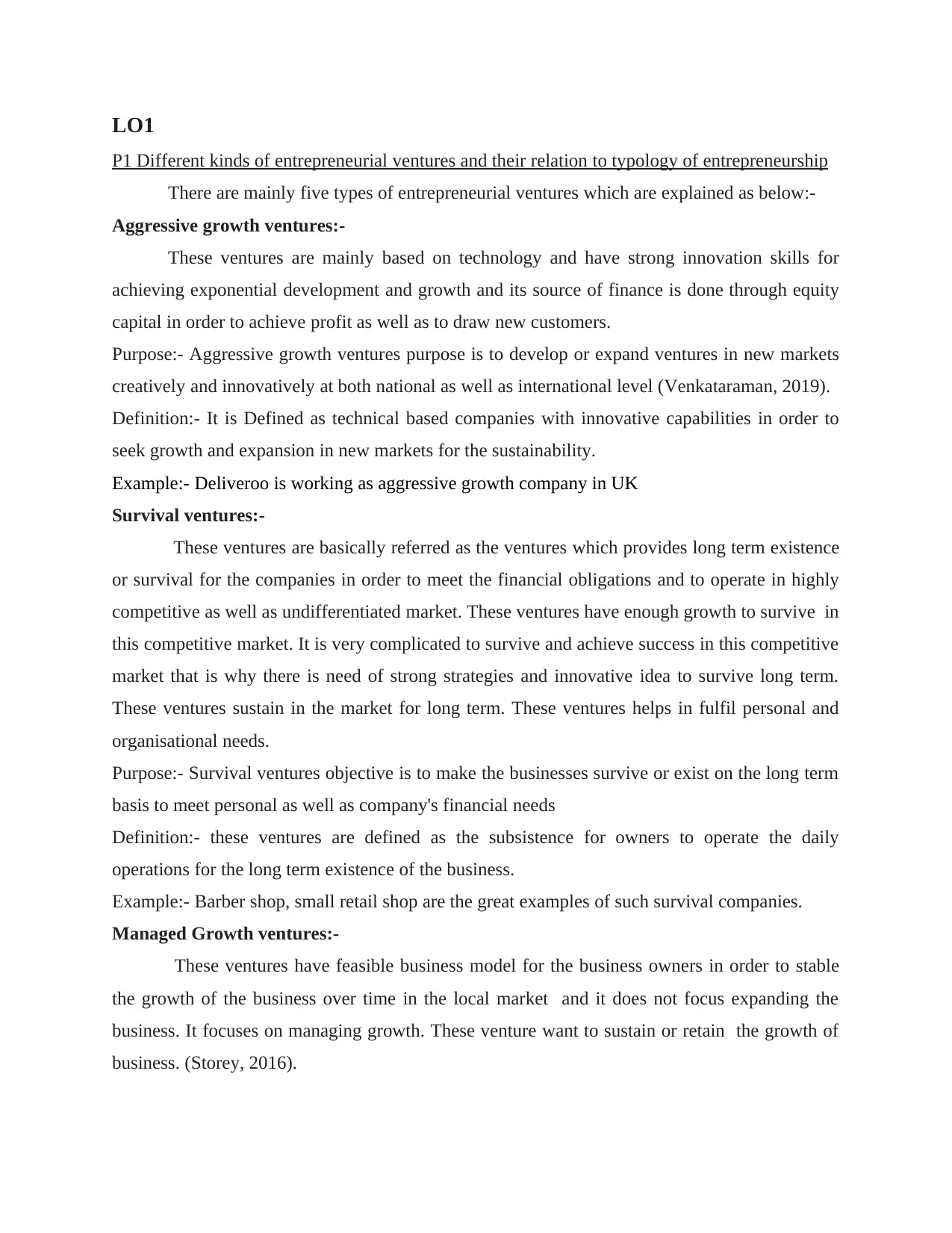
LO1
P1 Different kinds of entrepreneurial ventures and their relation to typology of entrepreneurship
There are mainly five types of entrepreneurial ventures which are explained as below:-
Aggressive growth ventures:-
These ventures are mainly based on technology and have strong innovation skills for
achieving exponential development and growth and its source of finance is done through equity
capital in order to achieve profit as well as to draw new customers.
Purpose:- Aggressive growth ventures purpose is to develop or expand ventures in new markets
creatively and innovatively at both national as well as international level (Venkataraman, 2019).
Definition:- It is Defined as technical based companies with innovative capabilities in order to
seek growth and expansion in new markets for the sustainability.
Example:- Deliveroo is working as aggressive growth company in UK
Survival ventures:-
These ventures are basically referred as the ventures which provides long term existence
or survival for the companies in order to meet the financial obligations and to operate in highly
competitive as well as undifferentiated market. These ventures have enough growth to survive in
this competitive market. It is very complicated to survive and achieve success in this competitive
market that is why there is need of strong strategies and innovative idea to survive long term.
These ventures sustain in the market for long term. These ventures helps in fulfil personal and
organisational needs.
Purpose:- Survival ventures objective is to make the businesses survive or exist on the long term
basis to meet personal as well as company's financial needs
Definition:- these ventures are defined as the subsistence for owners to operate the daily
operations for the long term existence of the business.
Example:- Barber shop, small retail shop are the great examples of such survival companies.
Managed Growth ventures:-
These ventures have feasible business model for the business owners in order to stable
the growth of the business over time in the local market and it does not focus expanding the
business. It focuses on managing growth. These venture want to sustain or retain the growth of
business. (Storey, 2016).
P1 Different kinds of entrepreneurial ventures and their relation to typology of entrepreneurship
There are mainly five types of entrepreneurial ventures which are explained as below:-
Aggressive growth ventures:-
These ventures are mainly based on technology and have strong innovation skills for
achieving exponential development and growth and its source of finance is done through equity
capital in order to achieve profit as well as to draw new customers.
Purpose:- Aggressive growth ventures purpose is to develop or expand ventures in new markets
creatively and innovatively at both national as well as international level (Venkataraman, 2019).
Definition:- It is Defined as technical based companies with innovative capabilities in order to
seek growth and expansion in new markets for the sustainability.
Example:- Deliveroo is working as aggressive growth company in UK
Survival ventures:-
These ventures are basically referred as the ventures which provides long term existence
or survival for the companies in order to meet the financial obligations and to operate in highly
competitive as well as undifferentiated market. These ventures have enough growth to survive in
this competitive market. It is very complicated to survive and achieve success in this competitive
market that is why there is need of strong strategies and innovative idea to survive long term.
These ventures sustain in the market for long term. These ventures helps in fulfil personal and
organisational needs.
Purpose:- Survival ventures objective is to make the businesses survive or exist on the long term
basis to meet personal as well as company's financial needs
Definition:- these ventures are defined as the subsistence for owners to operate the daily
operations for the long term existence of the business.
Example:- Barber shop, small retail shop are the great examples of such survival companies.
Managed Growth ventures:-
These ventures have feasible business model for the business owners in order to stable
the growth of the business over time in the local market and it does not focus expanding the
business. It focuses on managing growth. These venture want to sustain or retain the growth of
business. (Storey, 2016).
Paraphrase This Document
Need a fresh take? Get an instant paraphrase of this document with our AI Paraphraser
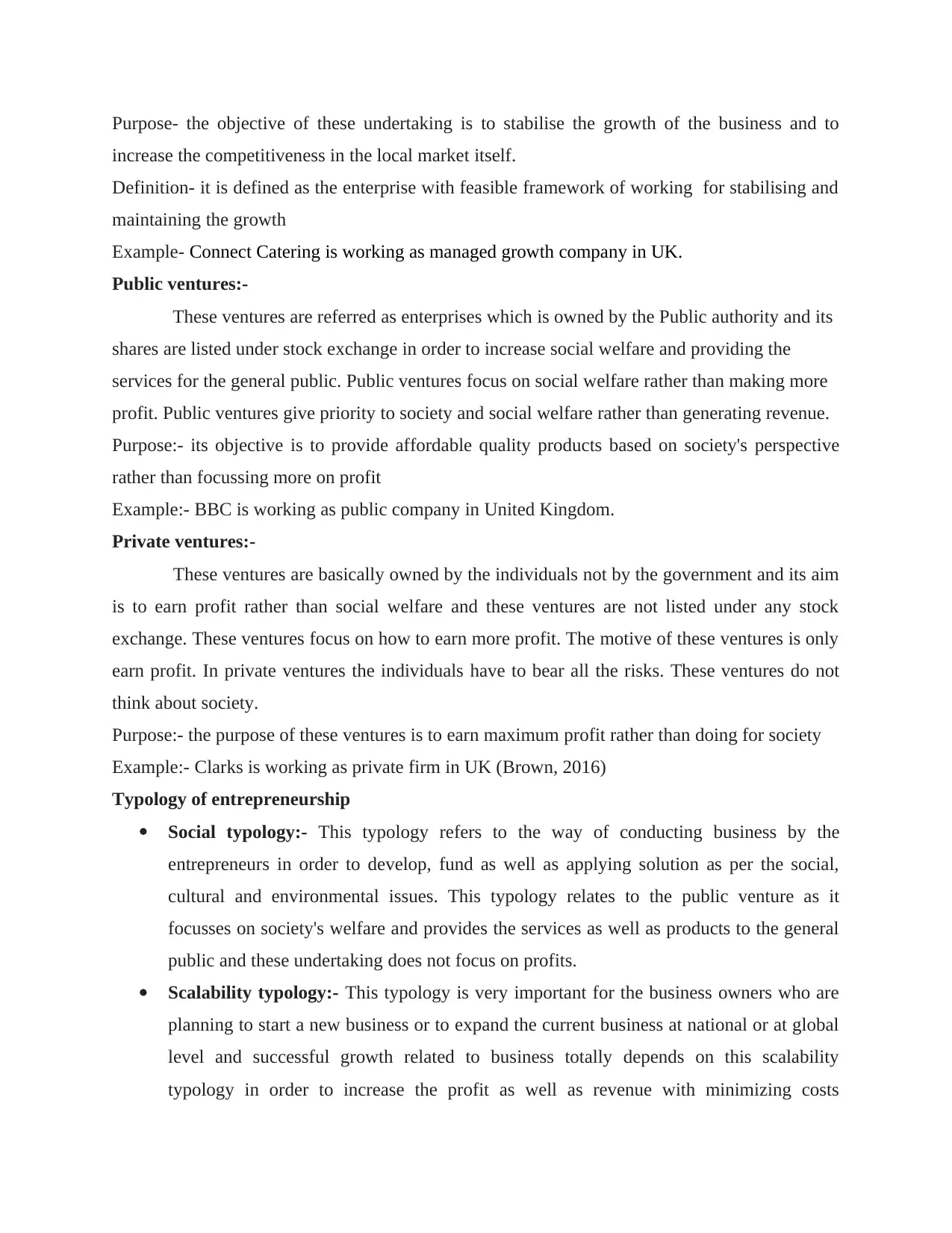
Purpose- the objective of these undertaking is to stabilise the growth of the business and to
increase the competitiveness in the local market itself.
Definition- it is defined as the enterprise with feasible framework of working for stabilising and
maintaining the growth
Example- Connect Catering is working as managed growth company in UK.
Public ventures:-
These ventures are referred as enterprises which is owned by the Public authority and its
shares are listed under stock exchange in order to increase social welfare and providing the
services for the general public. Public ventures focus on social welfare rather than making more
profit. Public ventures give priority to society and social welfare rather than generating revenue.
Purpose:- its objective is to provide affordable quality products based on society's perspective
rather than focussing more on profit
Example:- BBC is working as public company in United Kingdom.
Private ventures:-
These ventures are basically owned by the individuals not by the government and its aim
is to earn profit rather than social welfare and these ventures are not listed under any stock
exchange. These ventures focus on how to earn more profit. The motive of these ventures is only
earn profit. In private ventures the individuals have to bear all the risks. These ventures do not
think about society.
Purpose:- the purpose of these ventures is to earn maximum profit rather than doing for society
Example:- Clarks is working as private firm in UK (Brown, 2016)
Typology of entrepreneurship
Social typology:- This typology refers to the way of conducting business by the
entrepreneurs in order to develop, fund as well as applying solution as per the social,
cultural and environmental issues. This typology relates to the public venture as it
focusses on society's welfare and provides the services as well as products to the general
public and these undertaking does not focus on profits.
Scalability typology:- This typology is very important for the business owners who are
planning to start a new business or to expand the current business at national or at global
level and successful growth related to business totally depends on this scalability
typology in order to increase the profit as well as revenue with minimizing costs
increase the competitiveness in the local market itself.
Definition- it is defined as the enterprise with feasible framework of working for stabilising and
maintaining the growth
Example- Connect Catering is working as managed growth company in UK.
Public ventures:-
These ventures are referred as enterprises which is owned by the Public authority and its
shares are listed under stock exchange in order to increase social welfare and providing the
services for the general public. Public ventures focus on social welfare rather than making more
profit. Public ventures give priority to society and social welfare rather than generating revenue.
Purpose:- its objective is to provide affordable quality products based on society's perspective
rather than focussing more on profit
Example:- BBC is working as public company in United Kingdom.
Private ventures:-
These ventures are basically owned by the individuals not by the government and its aim
is to earn profit rather than social welfare and these ventures are not listed under any stock
exchange. These ventures focus on how to earn more profit. The motive of these ventures is only
earn profit. In private ventures the individuals have to bear all the risks. These ventures do not
think about society.
Purpose:- the purpose of these ventures is to earn maximum profit rather than doing for society
Example:- Clarks is working as private firm in UK (Brown, 2016)
Typology of entrepreneurship
Social typology:- This typology refers to the way of conducting business by the
entrepreneurs in order to develop, fund as well as applying solution as per the social,
cultural and environmental issues. This typology relates to the public venture as it
focusses on society's welfare and provides the services as well as products to the general
public and these undertaking does not focus on profits.
Scalability typology:- This typology is very important for the business owners who are
planning to start a new business or to expand the current business at national or at global
level and successful growth related to business totally depends on this scalability
typology in order to increase the profit as well as revenue with minimizing costs
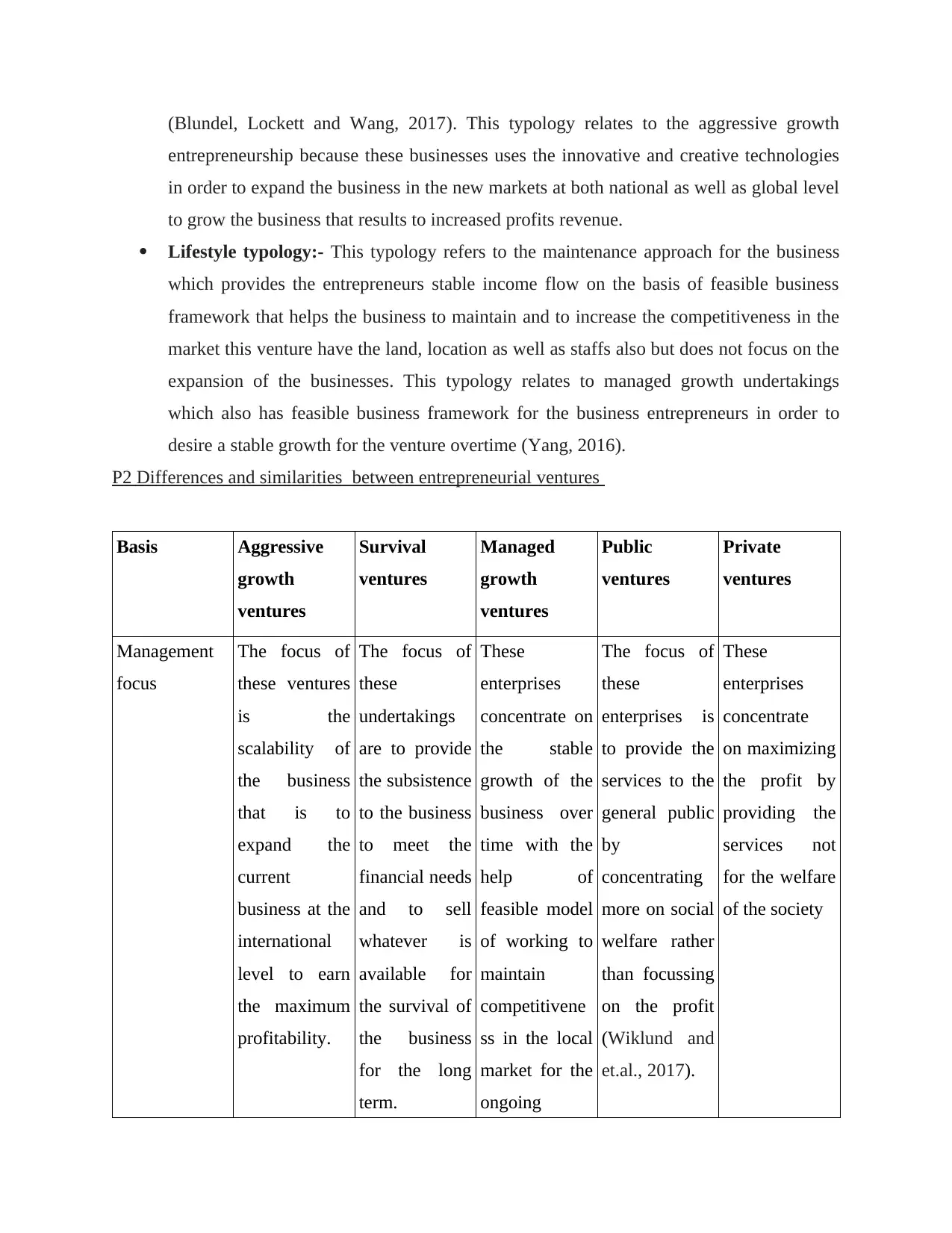
(Blundel, Lockett and Wang, 2017). This typology relates to the aggressive growth
entrepreneurship because these businesses uses the innovative and creative technologies
in order to expand the business in the new markets at both national as well as global level
to grow the business that results to increased profits revenue.
Lifestyle typology:- This typology refers to the maintenance approach for the business
which provides the entrepreneurs stable income flow on the basis of feasible business
framework that helps the business to maintain and to increase the competitiveness in the
market this venture have the land, location as well as staffs also but does not focus on the
expansion of the businesses. This typology relates to managed growth undertakings
which also has feasible business framework for the business entrepreneurs in order to
desire a stable growth for the venture overtime (Yang, 2016).
P2 Differences and similarities between entrepreneurial ventures
Basis Aggressive
growth
ventures
Survival
ventures
Managed
growth
ventures
Public
ventures
Private
ventures
Management
focus
The focus of
these ventures
is the
scalability of
the business
that is to
expand the
current
business at the
international
level to earn
the maximum
profitability.
The focus of
these
undertakings
are to provide
the subsistence
to the business
to meet the
financial needs
and to sell
whatever is
available for
the survival of
the business
for the long
term.
These
enterprises
concentrate on
the stable
growth of the
business over
time with the
help of
feasible model
of working to
maintain
competitivene
ss in the local
market for the
ongoing
The focus of
these
enterprises is
to provide the
services to the
general public
by
concentrating
more on social
welfare rather
than focussing
on the profit
(Wiklund and
et.al., 2017).
These
enterprises
concentrate
on maximizing
the profit by
providing the
services not
for the welfare
of the society
entrepreneurship because these businesses uses the innovative and creative technologies
in order to expand the business in the new markets at both national as well as global level
to grow the business that results to increased profits revenue.
Lifestyle typology:- This typology refers to the maintenance approach for the business
which provides the entrepreneurs stable income flow on the basis of feasible business
framework that helps the business to maintain and to increase the competitiveness in the
market this venture have the land, location as well as staffs also but does not focus on the
expansion of the businesses. This typology relates to managed growth undertakings
which also has feasible business framework for the business entrepreneurs in order to
desire a stable growth for the venture overtime (Yang, 2016).
P2 Differences and similarities between entrepreneurial ventures
Basis Aggressive
growth
ventures
Survival
ventures
Managed
growth
ventures
Public
ventures
Private
ventures
Management
focus
The focus of
these ventures
is the
scalability of
the business
that is to
expand the
current
business at the
international
level to earn
the maximum
profitability.
The focus of
these
undertakings
are to provide
the subsistence
to the business
to meet the
financial needs
and to sell
whatever is
available for
the survival of
the business
for the long
term.
These
enterprises
concentrate on
the stable
growth of the
business over
time with the
help of
feasible model
of working to
maintain
competitivene
ss in the local
market for the
ongoing
The focus of
these
enterprises is
to provide the
services to the
general public
by
concentrating
more on social
welfare rather
than focussing
on the profit
(Wiklund and
et.al., 2017).
These
enterprises
concentrate
on maximizing
the profit by
providing the
services not
for the welfare
of the society
⊘ This is a preview!⊘
Do you want full access?
Subscribe today to unlock all pages.

Trusted by 1+ million students worldwide
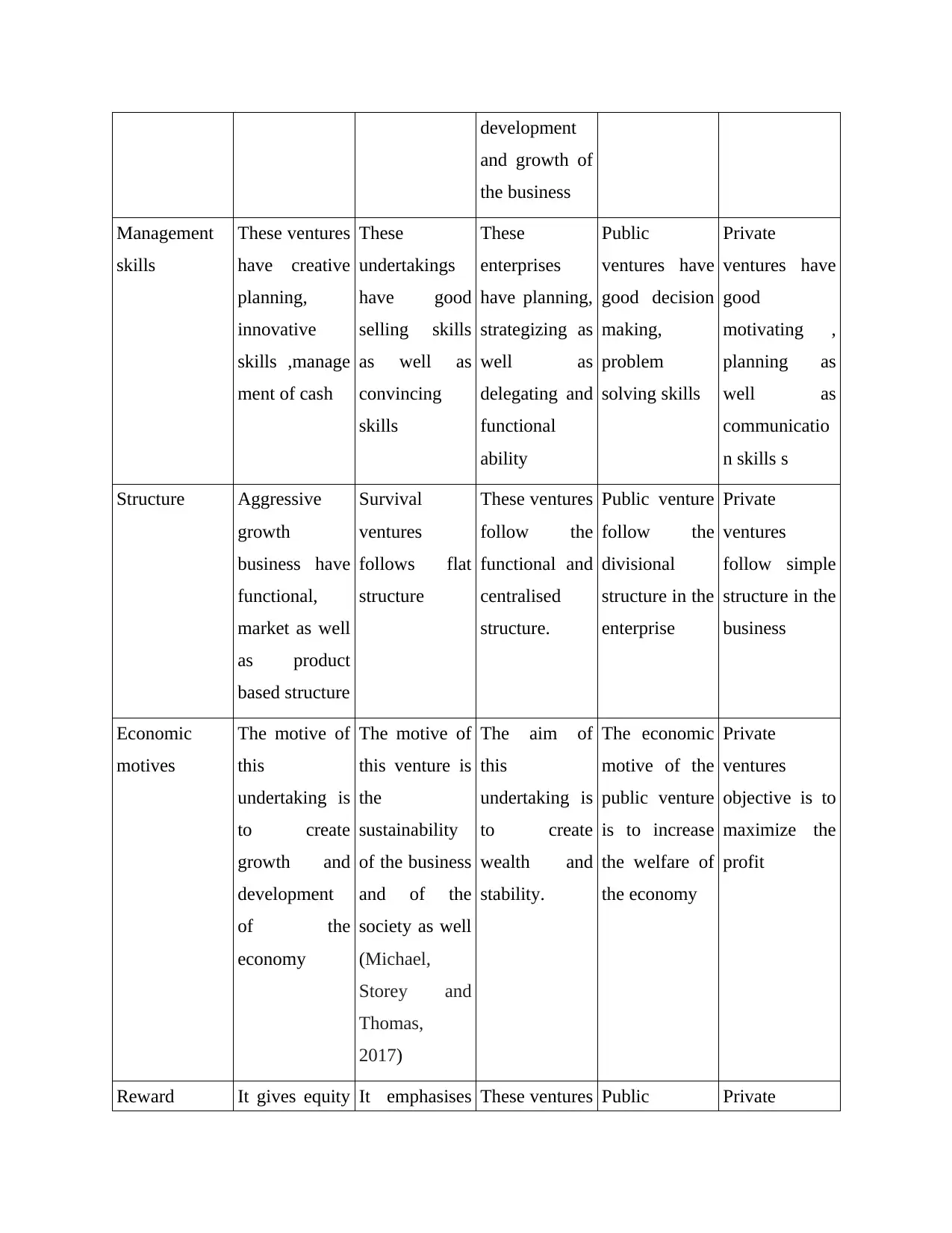
development
and growth of
the business
Management
skills
These ventures
have creative
planning,
innovative
skills ,manage
ment of cash
These
undertakings
have good
selling skills
as well as
convincing
skills
These
enterprises
have planning,
strategizing as
well as
delegating and
functional
ability
Public
ventures have
good decision
making,
problem
solving skills
Private
ventures have
good
motivating ,
planning as
well as
communicatio
n skills s
Structure Aggressive
growth
business have
functional,
market as well
as product
based structure
Survival
ventures
follows flat
structure
These ventures
follow the
functional and
centralised
structure.
Public venture
follow the
divisional
structure in the
enterprise
Private
ventures
follow simple
structure in the
business
Economic
motives
The motive of
this
undertaking is
to create
growth and
development
of the
economy
The motive of
this venture is
the
sustainability
of the business
and of the
society as well
(Michael,
Storey and
Thomas,
2017)
The aim of
this
undertaking is
to create
wealth and
stability.
The economic
motive of the
public venture
is to increase
the welfare of
the economy
Private
ventures
objective is to
maximize the
profit
Reward It gives equity It emphasises These ventures Public Private
and growth of
the business
Management
skills
These ventures
have creative
planning,
innovative
skills ,manage
ment of cash
These
undertakings
have good
selling skills
as well as
convincing
skills
These
enterprises
have planning,
strategizing as
well as
delegating and
functional
ability
Public
ventures have
good decision
making,
problem
solving skills
Private
ventures have
good
motivating ,
planning as
well as
communicatio
n skills s
Structure Aggressive
growth
business have
functional,
market as well
as product
based structure
Survival
ventures
follows flat
structure
These ventures
follow the
functional and
centralised
structure.
Public venture
follow the
divisional
structure in the
enterprise
Private
ventures
follow simple
structure in the
business
Economic
motives
The motive of
this
undertaking is
to create
growth and
development
of the
economy
The motive of
this venture is
the
sustainability
of the business
and of the
society as well
(Michael,
Storey and
Thomas,
2017)
The aim of
this
undertaking is
to create
wealth and
stability.
The economic
motive of the
public venture
is to increase
the welfare of
the economy
Private
ventures
objective is to
maximize the
profit
Reward It gives equity It emphasises These ventures Public Private
Paraphrase This Document
Need a fresh take? Get an instant paraphrase of this document with our AI Paraphraser
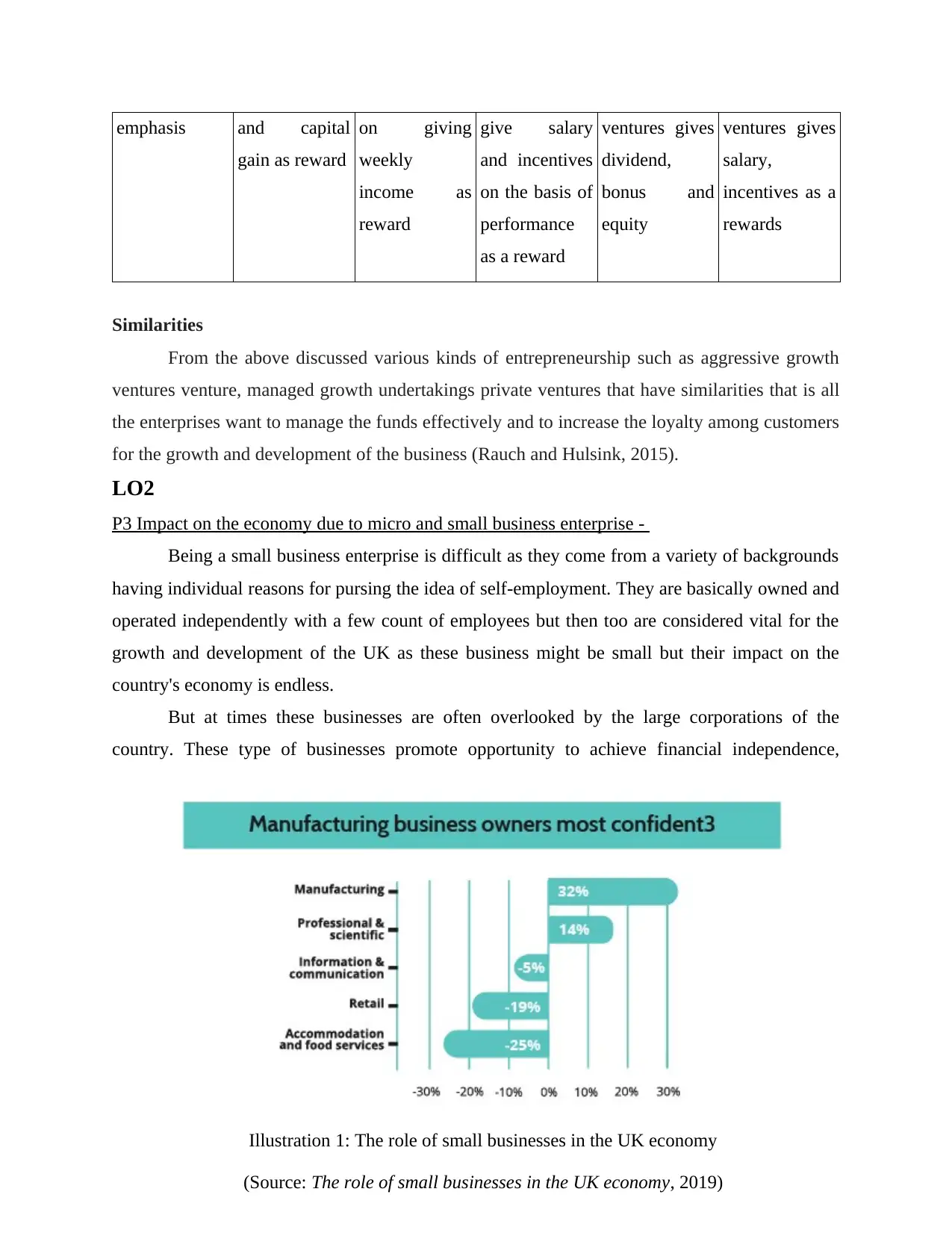
emphasis and capital
gain as reward
on giving
weekly
income as
reward
give salary
and incentives
on the basis of
performance
as a reward
ventures gives
dividend,
bonus and
equity
ventures gives
salary,
incentives as a
rewards
Similarities
From the above discussed various kinds of entrepreneurship such as aggressive growth
ventures venture, managed growth undertakings private ventures that have similarities that is all
the enterprises want to manage the funds effectively and to increase the loyalty among customers
for the growth and development of the business (Rauch and Hulsink, 2015).
LO2
P3 Impact on the economy due to micro and small business enterprise -
Being a small business enterprise is difficult as they come from a variety of backgrounds
having individual reasons for pursing the idea of self-employment. They are basically owned and
operated independently with a few count of employees but then too are considered vital for the
growth and development of the UK as these business might be small but their impact on the
country's economy is endless.
But at times these businesses are often overlooked by the large corporations of the
country. These type of businesses promote opportunity to achieve financial independence,
Illustration 1: The role of small businesses in the UK economy
(Source: The role of small businesses in the UK economy, 2019)
gain as reward
on giving
weekly
income as
reward
give salary
and incentives
on the basis of
performance
as a reward
ventures gives
dividend,
bonus and
equity
ventures gives
salary,
incentives as a
rewards
Similarities
From the above discussed various kinds of entrepreneurship such as aggressive growth
ventures venture, managed growth undertakings private ventures that have similarities that is all
the enterprises want to manage the funds effectively and to increase the loyalty among customers
for the growth and development of the business (Rauch and Hulsink, 2015).
LO2
P3 Impact on the economy due to micro and small business enterprise -
Being a small business enterprise is difficult as they come from a variety of backgrounds
having individual reasons for pursing the idea of self-employment. They are basically owned and
operated independently with a few count of employees but then too are considered vital for the
growth and development of the UK as these business might be small but their impact on the
country's economy is endless.
But at times these businesses are often overlooked by the large corporations of the
country. These type of businesses promote opportunity to achieve financial independence,
Illustration 1: The role of small businesses in the UK economy
(Source: The role of small businesses in the UK economy, 2019)
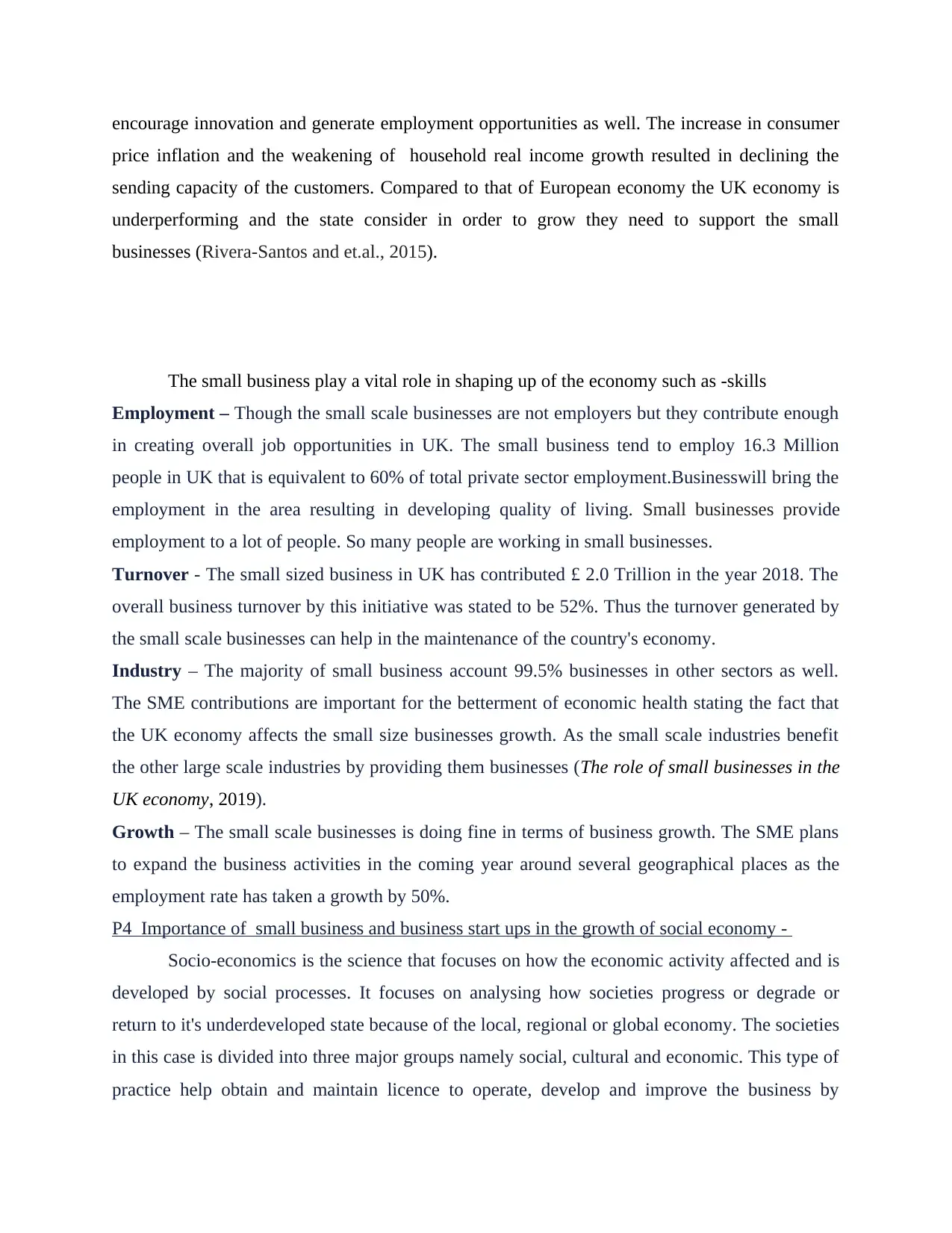
encourage innovation and generate employment opportunities as well. The increase in consumer
price inflation and the weakening of household real income growth resulted in declining the
sending capacity of the customers. Compared to that of European economy the UK economy is
underperforming and the state consider in order to grow they need to support the small
businesses (Rivera-Santos and et.al., 2015).
The small business play a vital role in shaping up of the economy such as -skills
Employment – Though the small scale businesses are not employers but they contribute enough
in creating overall job opportunities in UK. The small business tend to employ 16.3 Million
people in UK that is equivalent to 60% of total private sector employment.Businesswill bring the
employment in the area resulting in developing quality of living. Small businesses provide
employment to a lot of people. So many people are working in small businesses.
Turnover - The small sized business in UK has contributed £ 2.0 Trillion in the year 2018. The
overall business turnover by this initiative was stated to be 52%. Thus the turnover generated by
the small scale businesses can help in the maintenance of the country's economy.
Industry – The majority of small business account 99.5% businesses in other sectors as well.
The SME contributions are important for the betterment of economic health stating the fact that
the UK economy affects the small size businesses growth. As the small scale industries benefit
the other large scale industries by providing them businesses (The role of small businesses in the
UK economy, 2019).
Growth – The small scale businesses is doing fine in terms of business growth. The SME plans
to expand the business activities in the coming year around several geographical places as the
employment rate has taken a growth by 50%.
P4 Importance of small business and business start ups in the growth of social economy -
Socio-economics is the science that focuses on how the economic activity affected and is
developed by social processes. It focuses on analysing how societies progress or degrade or
return to it's underdeveloped state because of the local, regional or global economy. The societies
in this case is divided into three major groups namely social, cultural and economic. This type of
practice help obtain and maintain licence to operate, develop and improve the business by
price inflation and the weakening of household real income growth resulted in declining the
sending capacity of the customers. Compared to that of European economy the UK economy is
underperforming and the state consider in order to grow they need to support the small
businesses (Rivera-Santos and et.al., 2015).
The small business play a vital role in shaping up of the economy such as -skills
Employment – Though the small scale businesses are not employers but they contribute enough
in creating overall job opportunities in UK. The small business tend to employ 16.3 Million
people in UK that is equivalent to 60% of total private sector employment.Businesswill bring the
employment in the area resulting in developing quality of living. Small businesses provide
employment to a lot of people. So many people are working in small businesses.
Turnover - The small sized business in UK has contributed £ 2.0 Trillion in the year 2018. The
overall business turnover by this initiative was stated to be 52%. Thus the turnover generated by
the small scale businesses can help in the maintenance of the country's economy.
Industry – The majority of small business account 99.5% businesses in other sectors as well.
The SME contributions are important for the betterment of economic health stating the fact that
the UK economy affects the small size businesses growth. As the small scale industries benefit
the other large scale industries by providing them businesses (The role of small businesses in the
UK economy, 2019).
Growth – The small scale businesses is doing fine in terms of business growth. The SME plans
to expand the business activities in the coming year around several geographical places as the
employment rate has taken a growth by 50%.
P4 Importance of small business and business start ups in the growth of social economy -
Socio-economics is the science that focuses on how the economic activity affected and is
developed by social processes. It focuses on analysing how societies progress or degrade or
return to it's underdeveloped state because of the local, regional or global economy. The societies
in this case is divided into three major groups namely social, cultural and economic. This type of
practice help obtain and maintain licence to operate, develop and improve the business by
⊘ This is a preview!⊘
Do you want full access?
Subscribe today to unlock all pages.

Trusted by 1+ million students worldwide
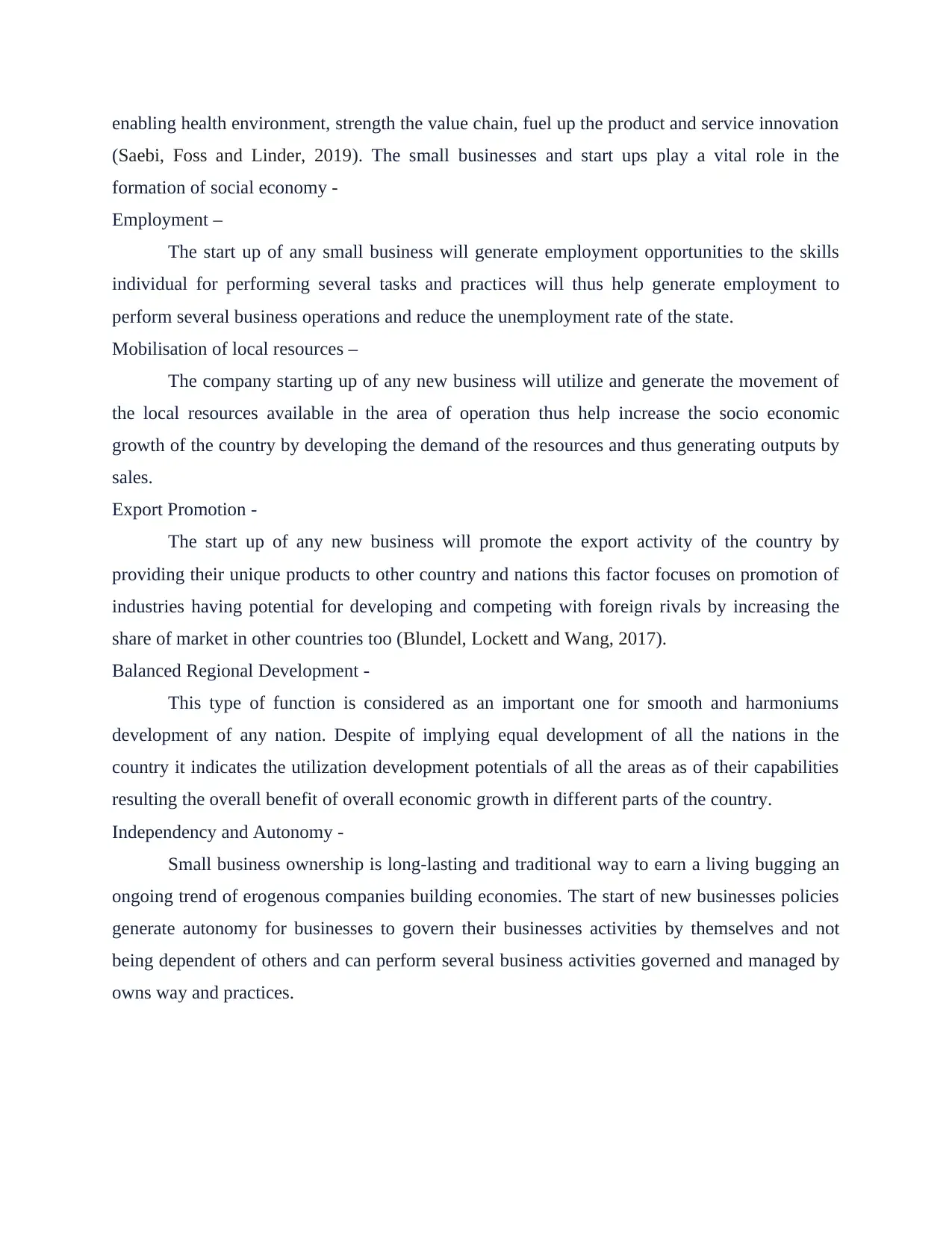
enabling health environment, strength the value chain, fuel up the product and service innovation
(Saebi, Foss and Linder, 2019). The small businesses and start ups play a vital role in the
formation of social economy -
Employment –
The start up of any small business will generate employment opportunities to the skills
individual for performing several tasks and practices will thus help generate employment to
perform several business operations and reduce the unemployment rate of the state.
Mobilisation of local resources –
The company starting up of any new business will utilize and generate the movement of
the local resources available in the area of operation thus help increase the socio economic
growth of the country by developing the demand of the resources and thus generating outputs by
sales.
Export Promotion -
The start up of any new business will promote the export activity of the country by
providing their unique products to other country and nations this factor focuses on promotion of
industries having potential for developing and competing with foreign rivals by increasing the
share of market in other countries too (Blundel, Lockett and Wang, 2017).
Balanced Regional Development -
This type of function is considered as an important one for smooth and harmoniums
development of any nation. Despite of implying equal development of all the nations in the
country it indicates the utilization development potentials of all the areas as of their capabilities
resulting the overall benefit of overall economic growth in different parts of the country.
Independency and Autonomy -
Small business ownership is long-lasting and traditional way to earn a living bugging an
ongoing trend of erogenous companies building economies. The start of new businesses policies
generate autonomy for businesses to govern their businesses activities by themselves and not
being dependent of others and can perform several business activities governed and managed by
owns way and practices.
(Saebi, Foss and Linder, 2019). The small businesses and start ups play a vital role in the
formation of social economy -
Employment –
The start up of any small business will generate employment opportunities to the skills
individual for performing several tasks and practices will thus help generate employment to
perform several business operations and reduce the unemployment rate of the state.
Mobilisation of local resources –
The company starting up of any new business will utilize and generate the movement of
the local resources available in the area of operation thus help increase the socio economic
growth of the country by developing the demand of the resources and thus generating outputs by
sales.
Export Promotion -
The start up of any new business will promote the export activity of the country by
providing their unique products to other country and nations this factor focuses on promotion of
industries having potential for developing and competing with foreign rivals by increasing the
share of market in other countries too (Blundel, Lockett and Wang, 2017).
Balanced Regional Development -
This type of function is considered as an important one for smooth and harmoniums
development of any nation. Despite of implying equal development of all the nations in the
country it indicates the utilization development potentials of all the areas as of their capabilities
resulting the overall benefit of overall economic growth in different parts of the country.
Independency and Autonomy -
Small business ownership is long-lasting and traditional way to earn a living bugging an
ongoing trend of erogenous companies building economies. The start of new businesses policies
generate autonomy for businesses to govern their businesses activities by themselves and not
being dependent of others and can perform several business activities governed and managed by
owns way and practices.
Paraphrase This Document
Need a fresh take? Get an instant paraphrase of this document with our AI Paraphraser
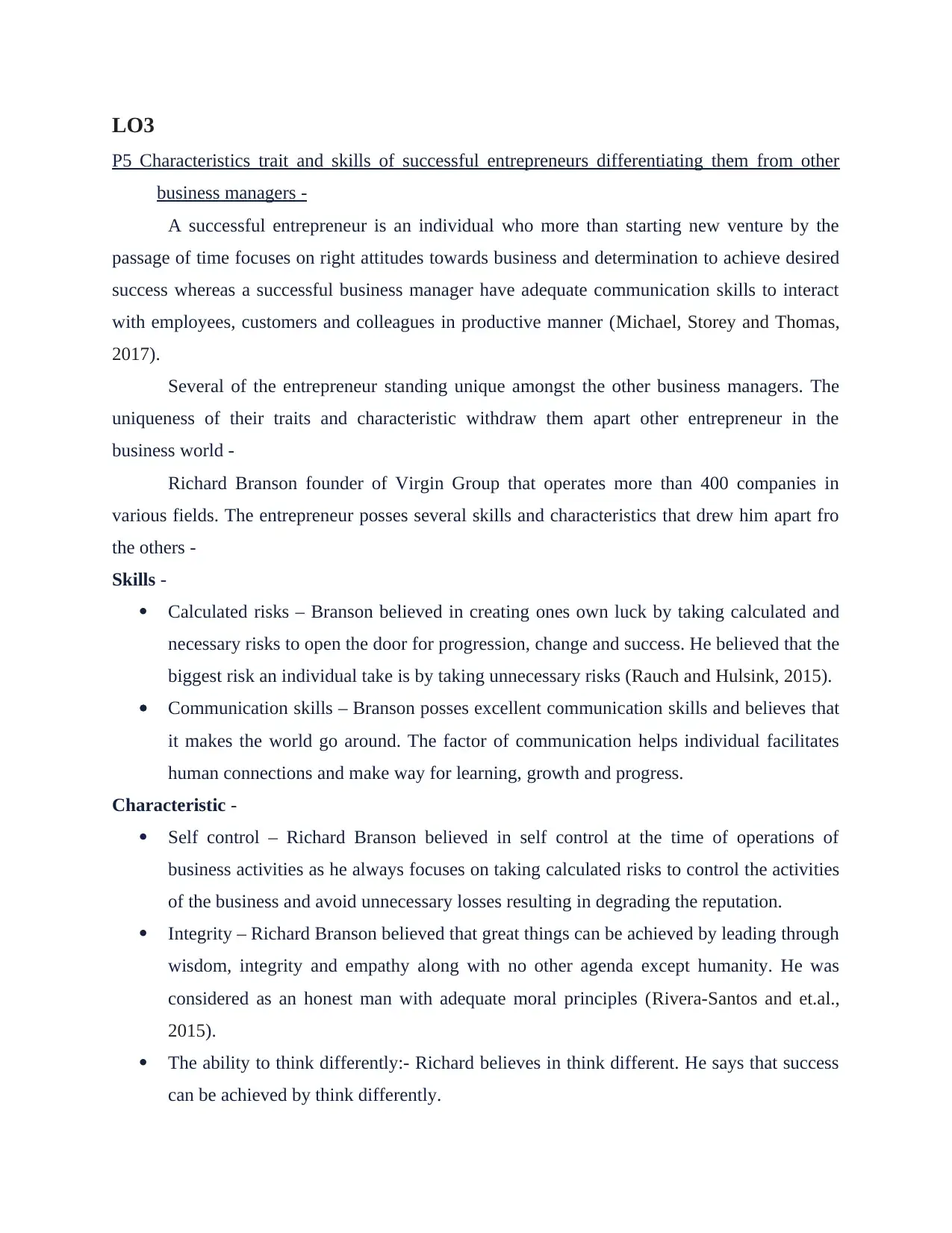
LO3
P5 Characteristics trait and skills of successful entrepreneurs differentiating them from other
business managers -
A successful entrepreneur is an individual who more than starting new venture by the
passage of time focuses on right attitudes towards business and determination to achieve desired
success whereas a successful business manager have adequate communication skills to interact
with employees, customers and colleagues in productive manner (Michael, Storey and Thomas,
2017).
Several of the entrepreneur standing unique amongst the other business managers. The
uniqueness of their traits and characteristic withdraw them apart other entrepreneur in the
business world -
Richard Branson founder of Virgin Group that operates more than 400 companies in
various fields. The entrepreneur posses several skills and characteristics that drew him apart fro
the others -
Skills -
Calculated risks – Branson believed in creating ones own luck by taking calculated and
necessary risks to open the door for progression, change and success. He believed that the
biggest risk an individual take is by taking unnecessary risks (Rauch and Hulsink, 2015).
Communication skills – Branson posses excellent communication skills and believes that
it makes the world go around. The factor of communication helps individual facilitates
human connections and make way for learning, growth and progress.
Characteristic -
Self control – Richard Branson believed in self control at the time of operations of
business activities as he always focuses on taking calculated risks to control the activities
of the business and avoid unnecessary losses resulting in degrading the reputation.
Integrity – Richard Branson believed that great things can be achieved by leading through
wisdom, integrity and empathy along with no other agenda except humanity. He was
considered as an honest man with adequate moral principles (Rivera-Santos and et.al.,
2015).
The ability to think differently:- Richard believes in think different. He says that success
can be achieved by think differently.
P5 Characteristics trait and skills of successful entrepreneurs differentiating them from other
business managers -
A successful entrepreneur is an individual who more than starting new venture by the
passage of time focuses on right attitudes towards business and determination to achieve desired
success whereas a successful business manager have adequate communication skills to interact
with employees, customers and colleagues in productive manner (Michael, Storey and Thomas,
2017).
Several of the entrepreneur standing unique amongst the other business managers. The
uniqueness of their traits and characteristic withdraw them apart other entrepreneur in the
business world -
Richard Branson founder of Virgin Group that operates more than 400 companies in
various fields. The entrepreneur posses several skills and characteristics that drew him apart fro
the others -
Skills -
Calculated risks – Branson believed in creating ones own luck by taking calculated and
necessary risks to open the door for progression, change and success. He believed that the
biggest risk an individual take is by taking unnecessary risks (Rauch and Hulsink, 2015).
Communication skills – Branson posses excellent communication skills and believes that
it makes the world go around. The factor of communication helps individual facilitates
human connections and make way for learning, growth and progress.
Characteristic -
Self control – Richard Branson believed in self control at the time of operations of
business activities as he always focuses on taking calculated risks to control the activities
of the business and avoid unnecessary losses resulting in degrading the reputation.
Integrity – Richard Branson believed that great things can be achieved by leading through
wisdom, integrity and empathy along with no other agenda except humanity. He was
considered as an honest man with adequate moral principles (Rivera-Santos and et.al.,
2015).
The ability to think differently:- Richard believes in think different. He says that success
can be achieved by think differently.
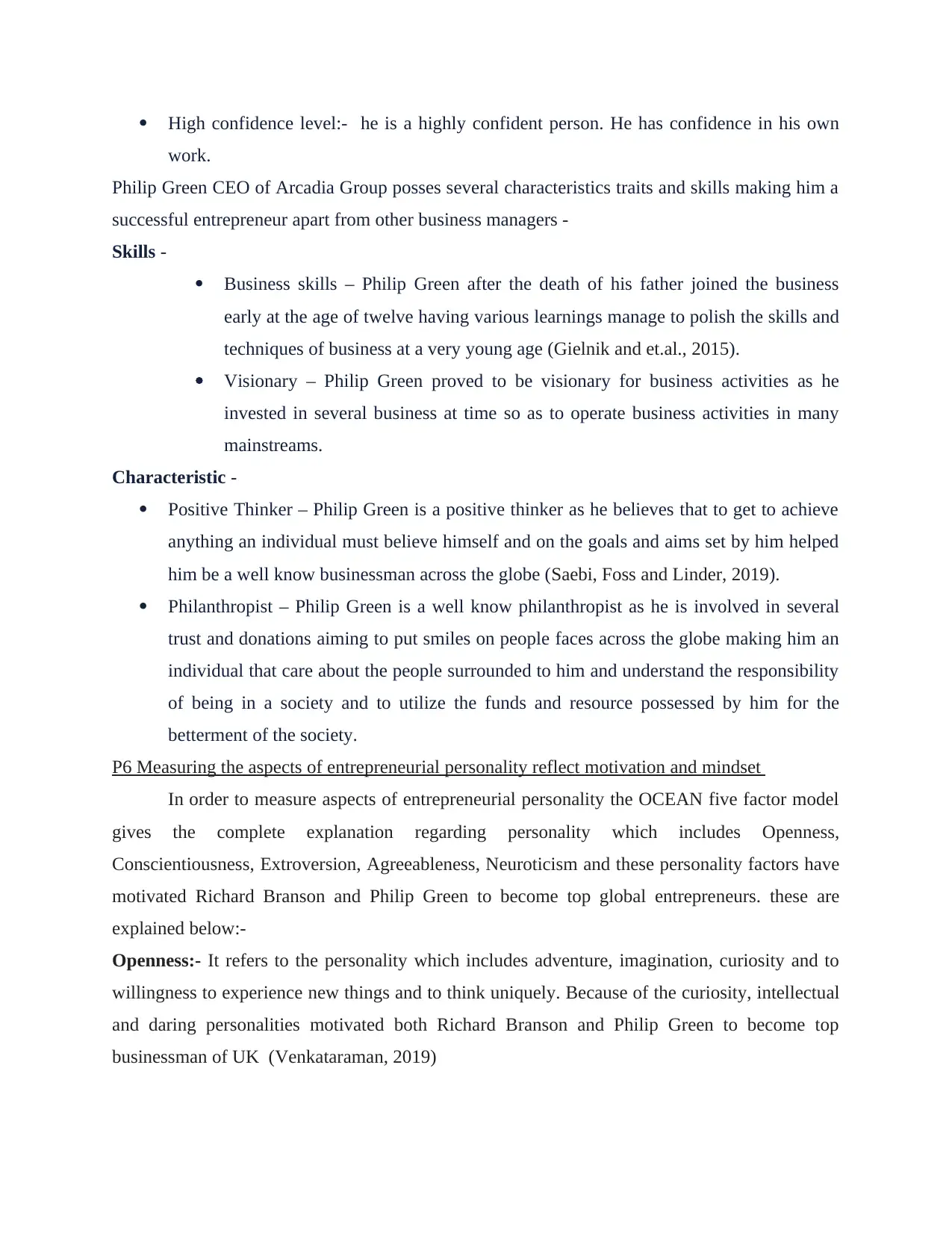
High confidence level:- he is a highly confident person. He has confidence in his own
work.
Philip Green CEO of Arcadia Group posses several characteristics traits and skills making him a
successful entrepreneur apart from other business managers -
Skills -
Business skills – Philip Green after the death of his father joined the business
early at the age of twelve having various learnings manage to polish the skills and
techniques of business at a very young age (Gielnik and et.al., 2015).
Visionary – Philip Green proved to be visionary for business activities as he
invested in several business at time so as to operate business activities in many
mainstreams.
Characteristic -
Positive Thinker – Philip Green is a positive thinker as he believes that to get to achieve
anything an individual must believe himself and on the goals and aims set by him helped
him be a well know businessman across the globe (Saebi, Foss and Linder, 2019).
Philanthropist – Philip Green is a well know philanthropist as he is involved in several
trust and donations aiming to put smiles on people faces across the globe making him an
individual that care about the people surrounded to him and understand the responsibility
of being in a society and to utilize the funds and resource possessed by him for the
betterment of the society.
P6 Measuring the aspects of entrepreneurial personality reflect motivation and mindset
In order to measure aspects of entrepreneurial personality the OCEAN five factor model
gives the complete explanation regarding personality which includes Openness,
Conscientiousness, Extroversion, Agreeableness, Neuroticism and these personality factors have
motivated Richard Branson and Philip Green to become top global entrepreneurs. these are
explained below:-
Openness:- It refers to the personality which includes adventure, imagination, curiosity and to
willingness to experience new things and to think uniquely. Because of the curiosity, intellectual
and daring personalities motivated both Richard Branson and Philip Green to become top
businessman of UK (Venkataraman, 2019)
work.
Philip Green CEO of Arcadia Group posses several characteristics traits and skills making him a
successful entrepreneur apart from other business managers -
Skills -
Business skills – Philip Green after the death of his father joined the business
early at the age of twelve having various learnings manage to polish the skills and
techniques of business at a very young age (Gielnik and et.al., 2015).
Visionary – Philip Green proved to be visionary for business activities as he
invested in several business at time so as to operate business activities in many
mainstreams.
Characteristic -
Positive Thinker – Philip Green is a positive thinker as he believes that to get to achieve
anything an individual must believe himself and on the goals and aims set by him helped
him be a well know businessman across the globe (Saebi, Foss and Linder, 2019).
Philanthropist – Philip Green is a well know philanthropist as he is involved in several
trust and donations aiming to put smiles on people faces across the globe making him an
individual that care about the people surrounded to him and understand the responsibility
of being in a society and to utilize the funds and resource possessed by him for the
betterment of the society.
P6 Measuring the aspects of entrepreneurial personality reflect motivation and mindset
In order to measure aspects of entrepreneurial personality the OCEAN five factor model
gives the complete explanation regarding personality which includes Openness,
Conscientiousness, Extroversion, Agreeableness, Neuroticism and these personality factors have
motivated Richard Branson and Philip Green to become top global entrepreneurs. these are
explained below:-
Openness:- It refers to the personality which includes adventure, imagination, curiosity and to
willingness to experience new things and to think uniquely. Because of the curiosity, intellectual
and daring personalities motivated both Richard Branson and Philip Green to become top
businessman of UK (Venkataraman, 2019)
⊘ This is a preview!⊘
Do you want full access?
Subscribe today to unlock all pages.

Trusted by 1+ million students worldwide
1 out of 15
Related Documents
Your All-in-One AI-Powered Toolkit for Academic Success.
+13062052269
info@desklib.com
Available 24*7 on WhatsApp / Email
![[object Object]](/_next/static/media/star-bottom.7253800d.svg)
Unlock your academic potential
Copyright © 2020–2026 A2Z Services. All Rights Reserved. Developed and managed by ZUCOL.



